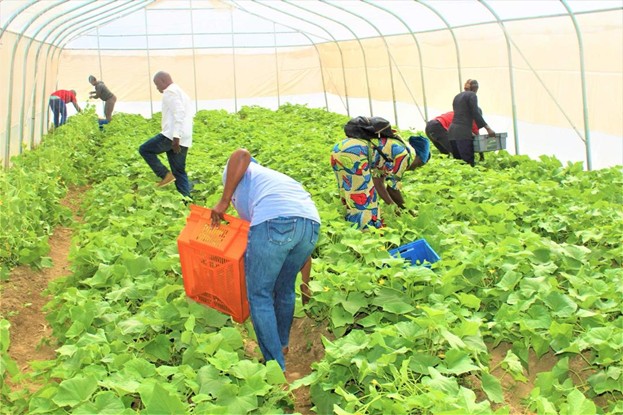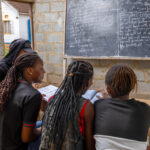By Isaac Atunlute
At a time when rainfall is becoming unpredictable, marine bodies are shrinking and hunger is growing more acute, Nigeria’s Southwest bloc is taking effective strides against climate change, evidenced in a rising line of greenhouse farms and solar-powered boreholes.
Over the past year, 323 greenhouse farms and 400 industrial boreholes powered by solar have been established across the six states in the region—Lagos, Ogun, Oyo, Osun, Ekiti, and Ondo.
The project complements a broader national push for water and food resilience, revamping food production in rural communities. It’s also broadening access to potable water even in drought-prone regions.
These greenhouses, fitted with drip irrigation systems, facilitate year-round cultivation of crops like tomatoes, cucumbers, and peppers.
By controlling water usage and shielding plants from extreme weather, these greenhouses cuts off the dependency on seasonal rainfall and reduce the risks of pest outbreaks, which often wipe out open-field crops.
On the other hand, the provision for 400 solar-powered boreholes reduces the customary water shortages prevalent in many rural and semi-urban areas.
A wide-ranging crisis
The green initiative taking off in the Southwest region builds on alarming data indicating that an estimated 70 million Nigerians lack access to safe drinking water.
UNICEF, similarly, reports that at least 70,000 children aged under five die each year from diarrhoeal diseases linked with unclean water, improper sanitation, and unhygienic conditions.
In response, the green initiative promotes the abundance of safe drinking water in affected areas in order to limit the residents’ dependency on diesel-powered pumps as well as contaminated open wells.
This dual intervention—water for farming and water for drinking—is a definitive cure for multiple problems.
In addition to decreased input cost and increased yields for farmers, the project also cuts down the distance required to obtain safe water.
Implemented together, such community-level infrastructure investment establishes self-sustaining cycles for farm development while promoting public health.
This reform is not unique to the Southwest alone, however.
The Jigawa State government recently unveiled a solar-powered irrigation scheme containing a 10 hectare drip-irrigated farm powered by four industrial boreholes.
This project directly benefits 80 smallholder farmers, enabling cultivation and improving crop yields and livelihoods.
In Plateau State, meanwhile, a greenhouse project, supported by the World Bank’s Agro‑Climatic Resilience in Semi‑Arid Landscapes (ACReSAL), equipped with solar-powered drip irrigation and powered by 200 watts of solar panels, is already in operation.
All of these initiatives tackle persisting food insecurity in the country.
According to the National Bureau of Statistics, food inflation rate in May 2025 was 21.14 per cent on a year-on-year basis, and this was 19.52 per cent points lower compared to the rate recorded in May 2024 (40.66 per cent).
A model of scalability
With drip irrigation requiring 90% less water than the traditional methods and greenhouses increasing yields per hectare, replicating such projects in other zones could drastically reduce Nigeria’s reliance on food imports while strengthening climate resilience.
Engaging traditional leaders during project implementation, as done in the Southwest, also fosters a sense of responsibility and acceptance, which is critical to the longevity of rural infrastructural projects.
In past initiatives, such as the Nigeria Erosion and Watershed Management Project (NEWMAP), community engagement played a prominent role in project success.
To sustain this technology, however, requires that the youths are not only trained to keep the systems running but that knowledge is transferred in such a way that it bolsters cultural ownership, not dependency.
Nigeria's Southwest region is implementing effective measures to address climate change through the establishment of 323 greenhouse farms and 400 solar-powered boreholes across six states. These initiatives aim to enhance food and water resilience, allowing for year-round crop cultivation via drip irrigation, reducing reliance on rainfall, and minimizing pest risks. Meanwhile, the solar-powered boreholes alleviate water shortages and provide safer drinking water in rural areas.
This dual approach not only aims to elevate agricultural yields and reduce input costs but also shortens the distance to source safe water. It establishes sustainable cycles for farm development and public health, contributing to food security amidst high inflation. The project is part of a broader effort, including similar initiatives in Jigawa and Plateau States, to tackle persistent food insecurity and reduce dependency on food imports. Community engagement and training of local youths are essential for the long-term success and cultural integration of these initiatives, ensuring self-sufficiency rather than dependency.






